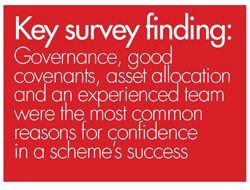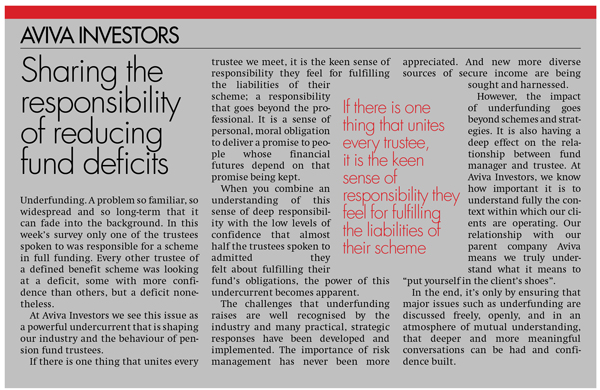Investment intelligence: How confident are you about fulfilling your fund’s obligations?
This is a pretty forward question to ask those whose fiduciary duties oblige them to meet the terms of section 67 of the Pensions Act 1995.
Though with four-fifths of defined benefit schemes in deficit, according to the Pension Protection Fund, there are a fair few trustees and pension scheme managers in a pessimistic mood.
Reflecting widespread gloom on markets, one chair of trustees lamented that he had been confident until the funding shifts this year.
A good half of the survey respondents were confident of fulfilling obligations, despite this. A few had DB schemes in surplus, while some were representatives of local authority schemes, whose ultimate employer – the government – was not about to go out of business in any foreseeable future.
Interestingly, one measure of confidence came from a chair of trustees who put a caveat in that they would fulfil their obligations, but not necessarily in the timeframe wanted by their members – a reference to his scheme’s shifting recovery plan.
What is the biggest contributor to your confidence or lack of confidence?
One of the most common ways this question was answered was to refer to the health of the sponsor company.
One was lucky enough to boast of an “excellent” sponsor covenant, while others merely cited “good’ covenants.
The chief executive of a leading fund summed up the mood of many who were left reliant on their sponsors, by saying: “I am comfortable we can pay our pensioners for the foreseeable future, but the fund is in deficit and will remain so for some time, which is a cause for nervousness. Even with a solvent employer such as the university sector, we are still dependent upon that as our back-stop rather than a fully-funded position.”
Equally the manager of a FTSE 250 DB scheme was thankful for his employer having a fairly sound business model, but warily noted its pension deficit was large compared to its market cap. He summed his mood as “concerned, but we are not Dawson International”.
A more positive spin on covenants was their help in pursuing an optimum investment strategy. Andrew Bradshaw, independent trustee at Ross Trustees, speaking for one of schemes he represents, said: “If the covenant is pretty good, that gives you a bit more leverage. You can be a bit more inventive on the investment side.”
However, a scheme manager of a mid-sized FTSE scheme hoped for improved profits at his sponsor, which would enable his scheme to pursue a less risky investment strategy. “There is no point in taking risk off the table too much when you are in the mire because you are just locking in that deficit.”
The chairman of trustees at a closed DB scheme said the support of a stable sponsor had enabled his scheme to have an investment policy based on “fundamentals rather than herd-like conventions”. And the chief executive of a public sector scheme welcomed the strength of her scheme’s sponsor for letting the scheme take a long-term view.
The state of the markets was the key topic for others. Low gilt yields was a common source of woe, as were the prospect of low investment yields over a long timeframe. “Things have got to get better at some point”, said the pensions manager of a private sector scheme.
Asset allocation aims
Reassuringly for the reputation of the pensions industry, many cited the self-reliance of the team looking after their funds for making them confident. A good half of the survey claimed strong governance as their source of confidence and often this came hand in hand with a clear and workable goal.
Perhaps not surprisingly, Alan Pickering, chairman of the Plumbing Pension Scheme, was one of the best exponents of this. He cited his scheme’s asset allocation as the source of confidence in fulfilling its funding obligations.
“We concentrate on asset allocation first and fund managers second; we have got a very good track record and so we are better funded as a result.”
He added: “We have a very active relationship with the intermediary (Aon Hewitt) and they use a suite of different fund managers to contribute to our desired level of market outperformance.”
For some, good governance meant long-term objectives for schemes closed to new members.
Matt Fuller, pensions investment manager at Kingfisher, said:“We have a target to be fully funded by 2030. It’s a journey we’ve been taking since the early 2000s and there is nothing at the moment to suggest that we’re deviated too far off course. We’ve got a relatively small deficit
[compared with] some schemes so that really helps.”
The finance manager of a local authority pension scheme also summed up what was making him confident as “a clear understanding of what the objectives of the fund are”.
Lastly, in a piece of bad news for those who would like to see more young faces in our industry, confidence was expressed by several in terms of the depth of experience of their trustees.
The trustee of an open £10m DB scheme said: “The knowledge that comes from substantial training and achieving qualifications as a trustee, plus many years’ experience [is a source of confidence], along with putting in place professional advisers who are committed to the scheme’s longevity.”
Despite the difference in size of scheme, the trustee of a £4bn DB scheme said something very similar. “We have a mature scheme, an excellent in-house team, an experienced board of trustees and a good relationship with the sponsor.”
While a trustee for an £8bn closed DB scheme concurred. “My confidence comes from have a very experienced board of trustees, which is supported by solid advisers.”
DC world
Confidence does not have much relevance for the defined contribution world, where the end pension can seem unknowable.
Malcolm Curzon, chair of trustees for the Habitat Pension Scheme, probably spoke for many trustees when he simply expressed confidence in what his board were doing on DC.
While the trustee for an £130m trustee scheme, Richard Minashi, put it more bluntly.
“While I am fairly confident that the scheme will meet its objectives in terms of governance, I am less confident it will meet members’ expectations in producing the pension income they want.”
Most Viewed
- What does Labour have in store for the pensions industry?
- LGPS latest: GLIL backers invest £475m for UK infrastructure push
- Dashboard costs rose by 23% in 2023, figures show
- Border to Coast launches UK strategy in major private markets push
- How the pensions industry can better support people with mental health problems




